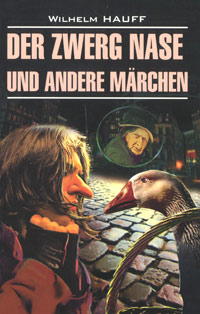Книга: Wilhelm Hauff «Der Zwerg Nase und Andere Marchen»

|
Серия: "Classical literature" В книгу для чтения включены 7 сказок немецкого писателя-романтика Вильгельма Гауфа: "Die Geschichte von Kalif Storch", "Das Marchen vom falschen Prinzen", "Der Scheik von Alessandria und seine Sldaven", "Der Zwerg Nase", "Der Affeals Mensch", "Die Geschichte Almansors", "Die Sage vom Hirsch-gulden" . Издание содержит краткую информацию о жизни Гауфа, комментарий к сказкам, а также словарь лексики, необходимой для пониманияи пересказа текстов. Книга адресуется всем, кто изучает немецкий язык, в первую очередь, студентам и школьникам старших классов. Издательство: "КАРО" (2010) Формат: 70x100/32, 256 стр.
ISBN: 978-5-9925-0494-1 Купить за 166 руб на Озоне |
Другие книги автора:
| Книга | Описание | Год | Цена | Тип книги |
|---|---|---|---|---|
| Der Zwerg Nase und Andere Marchen | В книгу для чтения включены 7 сказок немецкого писателя-романтика Вильгельма Гауфа: Die Geschichte von Kalif Storch, Das Marchen… — КАРО, (формат: 70x100/32, 256 стр.) Classical literature Подробнее... | бумажная книга |
Wilhelm Hauff
Wilhelm Hauff (
Biography
Wilhelm Hauff was born in
Young Hauff lost his father when he was seven years old, and his early education was practically self-gained in the library of his maternal grandfather at
On leaving the university, Hauff became tutor to the children of the famous Württemberg minister of war, General Baron Ernst Eugen von Hugel (1774-1849) and for them wrote his "Märchen" (
He also wrote there the first part of the "Mitteilungen aus den Memoiren des Satan" ("Memoirs of Beelzebub") (1826) and "Der Mann im Mond" ("The Man in the Moon") (1825). The latter, a parody of the sentimental and sensual novels of
Meanwhile, inspired by
While on a journey to
In January 1827, Hauff undertook the editorship of the "Stuttgart Morgenblatt" and in the following month married his cousin Luise Hauff, but his happiness was prematurely cut short by his death from fever on 28 November 1827.
Considering his brief life, Hauff was an extraordinarily prolific writer. The freshness and originality of his talent, his inventiveness, and his genial humour have won him a high place among the southern German prose writers of the early nineteenth century.
References
*"Sämtliche Werke", with a biography, edited by
*Selection by
*
*M. Mendheim, "Hauffs Leben und Werke" (1894)
*
ee also
*"
External links
* [http://www.ub.fu-berlin.de/internetquellen/fachinformation/germanistik/autoren/multi_fgh/hauff.html Collection of links with commentary (German)]
* [http://vorleser.net/html/halloween.html Sound samples to download]
* [http://www.1000-maerchen.de/wilhelm-hauff/index.html Many fairy tales (Märchen) available ] de icon
*
* [http://digital.library.upenn.edu/women/mcdonnell/hauff/hauff.html#caliph Collection of W.Hauff's Fairy Tales (English)]
Poems
* [http://www.onlinekunst.de/november/Mitternacht.htm Steh ich in finstrer Mitternacht]
* [http://freiburger-anthologie.ub.uni-freiburg.de/fa/fa.pl?cmd=gedichte&sub=show&noheader=1&add=&id=864 Reiters Morgenlied]
Links to Hauff's Work by
* [http://gutenberg.spiegel.de/autoren/hauff.htm Overview of Hauff with many of his texts online (German)]
* [http://www.gutenberg.org/browse/authors/h#a2125 Projekt Gutenberg.org]
References
*1911
Источник: Wilhelm Hauff
См. также в других словарях:
Liste von Märchen — Inhaltsverzeichnis 1 Liste von Märchen und Märchen Sammlungen 2 Ägyptische Märchen 3 Albanische Märchen 3.1 Johann Georg von Hahn … Deutsch Wikipedia
Liste der Opern — Diese Tabelle ist mit einem Klick in die jeweilige Spaltenüberschrift nach Bedarf sortierbar. Originaltitel Deutscher Titel Komponist Entstehung UA Librettist Literarische Vorlage Autor der Vorlage Postillon de Lonjumeau, Le Le Postillon de… … Deutsch Wikipedia
Lisbeth Zwerger — (* 26. Mai 1954 in Wien) ist eine österreichische Kinderbuchillustratorin. Lisbeth Zwerger studierte 1971 bis 1974 an der Hochschule für angewandte Kunst in Wien. Seit dem Erscheinen des ersten von ihr illustrierten Buches 1977 ist sie… … Deutsch Wikipedia
Kunstmärchen — Adelbert von Chamisso Peter Schlemihls wundersame Geschichte; Radierung von G. Cruikshank, 1827 Kunstmärchen sind eine spezielle Ausprägung der Literaturgattung des Märchens. Inhaltsverzeichnis … Deutsch Wikipedia
Familienfilm — Kinderfilme sind fürs Fernsehen, Kino oder für die DVD bzw. Videoauswertung produzierte Filme, die sich in erster Linie an Kinder richten. In thematischer und stilistischer Hinsicht gibt es kaum Beschränkungen, ihre Präsentation passt sich jedoch … Deutsch Wikipedia
Wilhelm Hauff — 1826 Wilhelm Hauff (* 29. November 1802 in Stuttgart; † 18. November 1827 ebenda) war ein deutscher Schriftsteller der Romantik. Er war ein Hauptvertreter der Schwäbischen Dichterschule … Deutsch Wikipedia
